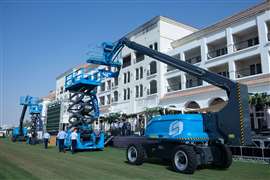Wow factor: IRN visits one of Speedy Hire's new Multi Service Centres (MSC).
03 February 2014

Speedy Hire’s newest Multi Service Centre (MSC) in Glasgow, UK, is part of a project that will see a complete restructuring its depot network. Murray Pollok visited the site and spoke to the company’s Colin Naylor, operations director for UK and Ireland.
Speedy Hire has plenty on its corporate mind just now, with accounting irregularities in its Middle East operation creating all the wrong kinds of headlines and leading to the untimely resignation of CEO Steve Corcoran, who, although not implicated personally, is to leave the company.
That ongoing trauma – with investigations still underway at the time of writing – comes at a particularly unfortunate time for the UK business because there were signs that its fortunes were finally improving, with evidence that market demand was starting to increase.
In addition, it had just made the very positive announcement to accelerate a major initiative to restructure its branch network in the UK, a project that is seen as crucial to the future of the company. That work was originally scheduled to be completed in 2017, but promising results so far have prompted Speedy to bring the finish date forward by two years to 2015.
Behind the scenes at Speedy the job of implementing the new UK depot structure continues apace. The aim is no less than a transformation of a national network of more than 400 ‘standard’ locations to a much smaller, three-tier network comprising a spine of seven Multi Service Centres (MSC) augmented by 40 Superstores and a further 130 to 170 local Express locations.
Colin Naylor, operations director for Speedy in the UK and Ireland, is one of the team who has to deliver this new network. Speaking to IRN at the newest MSC, in Glasgow - and before the Middle East problems were made public - he paints a credible picture of why the new network design will work.
“It’s all about optimising the operation”, he says, “We would rather have the right product in 50 locations than the wrong product at 200 locations.”
In essence, the MSC will consolidate existing multiple locations in major urban areas – eight existing locations will be collapsed into the new Glasgow MSC – and provide a logistical and workshop hub serving Superstores and Express centres and linking with other MSC hubs to deliver equipment to where it is needed in the country.
The Superstores are a step down in size and designed to house ‘clean’ equipment such as lifting, surveying and tools. These will have a trade desk and will be a ‘shopfront’ for customers; “Superstores will be highly visible, with foot traffic and trade counter facilities”, says Mr Naylor. In some cases, Superstores will be sited within an MSC, which is the case at the new site in Cambuslang, Glasgow.
“The Superstores mean a redistribution of sites, but we will have a more balanced range of services from a single site, and with a much better customer experience. It will give customers a ‘One Speedy’ experience”, he says.
Centralising the workshops at the MSC, says Mr Naylor will reduce risk by creating a more consistent level of servicing and repair.
More important, perhaps, and one of the reasons that the company is increasing the pace of the programme, is that the new network will drive up utilisation by making more of the fleet available.
“In future we will be able to increase utilisation and potentially reduce CapEx as well, all by getting the right products at the MSC locations for on-demand delivery”, he says, “Rather than have 10 locations each with 10 of a particular machine, we can have 90 at one location, pushing it on demand.”
Of course, this requires a logistics system behind it, from trucks and delivery drivers with PDAs to a new system enabling depots to source products, particularly the core fleet - the so-called ‘Never Ever Run-Out’ (NERO) items - which Speedy always aims to have available.
“Depots like to hold on to equipment, but the old model is disappearing”, says Mr Naylor, “Now, if a depot needs to find equipment, rather than making dozens of calls [to other depots], they will make one call to the asset search team. The asset team can repair, move or buy equipment.”
The new network scheme dovetails with Speedy’s strategy to target large, long term rental contracts with major accounts in sectors including water, power, road and rail. These kinds of contracts place particular demands on suppliers, with Network Rail, for example, requiring a response within 4 hours at any time of night and day. The MSCs will remain open 24/7.
The level of investment for the programme is sizeable. The 60000 ft2 Glasgow location – an existing warehouse in the east end of the city that Speedy is renting – will cost Speedy around £1 million to refit, including wash-down areas, paint shop, indoor training areas, more than 70 workshop bays and office space.
Speedy is expecting to spend around £10 million over the next 18 months in fitting out new locations, as well as £13-15 million costs in relation to departing from current rented properties that are now surplus to requirements.
A considerable amount of work is already complete: three of the MSCs are up and running – Glasgow being the latest - and four more will follow, including one each in Tamworth (the largest at 160000 ft2), Teeside and Bristol. There are now 26 Superstores in operation with 14 more in planning.
The accelerated programme is placing demands on Mr Naylor and his team. He says working in their favour is the fact that they now have a ‘template’ for the new locations and are working with the same contractors, who know the format.
“Anything is possible with cash and hard work”, he tells IRN, “The Board has agreed the concept; it’s now down to hard work and the project teams. I’m comfortable with the schedule.”
With the Glasgow site now up and running, the proof of the concept will be in the response from customers. Mr Naylor is optimistic about that as well; “We’ve brought a number of customers to the site and the general reaction is ‘wow!”
BOX STORY
Glasgow MSC
The new Multi Service Centre (MSC) in Cambusland, Glasgow, is replacing eight existing Speedy locations in the area, including dedicated Rail, Power and Tool hire locations and two workshops sites.
Colin Naylor says all existing staff from these centres, just over 100 people, are moving to the new location. “No colleagues left the business. It is about gearing up to grow – eight locations into one and creating a springboard to grow the business.”
The working environment for the workers will improve, with changing rooms equipped with wet and dry lockers and showers, plus a canteen area for breaks.
The enormous outside area, including wash-down area, is complemented by an equally large covered warehouse, with 57 separate 2 m by 2 m workshop bays, ten 5 m by 7.5 m bays and six 5 m by 5 m bays. There is a separate 130 m2 survey workshop. There is also an 80 m2 trade counter, including a stock of popular consumable items and an area for customers to have a coffee.
The site has seen a phased commissioning, with tools, lifting equipment and surveying first in, followed by power, plant and rail equipment.






